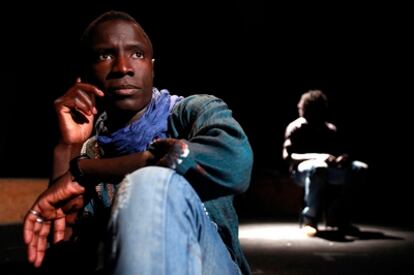This was not my dream
African immigrant street vendors use the theater to tell their story of disillusionment with a European reality they hoped would be different
It's a familiar spectacle on Spanish television. A group of Africans are huddled together in Red Cross blankets. Tired, apprehensive faces come into view as torches flash over the young men. They have reached Spanish shores in an overcrowded fishing boat, in search of a better life in Europe.
But the men at the center of this particular humanitarian drama can actually speak to the public. The group are actors performing the opening scenes from La manta no es mi sueño (Street vending is not my dream), a play devised by and starring Senegalese migrants who work illegally hawking rip-off goods to survive.
"You see the same guy selling sunglasses every day, but at the same time he's invisible," explains Nathalie Seseña, a well-known sit-com actress who directs the group. Manteros, as they are known, sell their goods in the street on blankets (mantas, in Spanish). "Most people know nothing about their story."
"Our lives are very difficult; with theater we really get the message out"
He has to leave now so he can flog lights to drinkers in bars to make a living
La Inestable Compañia Kourel Africano theater group is here to fill the knowledge gap. The show began as a one-off performance last summer but its striking young cast has swelled from four to 13 and it's just been back for a one-month stint at the Alfil theater in Madrid's downtown Malasaña district.
"We want to tell the mantero's story, the stages he goes through. The hope when he arrives, how he lives, how it ends," says 23-year-old Omar Sylla. He plays a brashly optimistic character who tells the other occupants of his boat that work will be easy to come by because "in Europe, everything is sorted."
This group of West African migrants has drawn solely on their own experiences to write the script, which narrates how Europe, once experienced, falls painfully short of their expectations. Moustapha Ladiano, who plays another of the leading roles, announces solemnly at the beginning of the show that the troupe are not actors.
Nathalie Seseña knows this only too well. She has had to make all roles interchangeable to allow for sudden disappearances among her cast, and has frequently found herself in police stations and courtrooms negotiating their release. Each completed rehearsal is nothing short of a miracle, she says.
But despite the group's lack of formal training and deeply unstable personal lives, they have devised an engaging, fresh drama.
The manteros wryly narrate their early naivety and day-to-day lives: Moustapha mistakes an expulsion order for coveted work papers, and a hapless friend is unable to conceal a son's imprisonment from his fierce mother, who calls repeatedly from Senegal refusing to be fobbed off. Manteros are shown squabbling over pavement space and complaining that the crisis has brought down sales. They call out to promote the high standards of their notoriously poor-quality DVDs.
These are humorous touches in a powerful story of solidarity and dreams. But the message is ultimately one of crushing disappointment. High hopes give way to frustration and anger as Africa's young men face up to the harsh realities of exclusion for illegal migrants in Europe. But the show never descends into self pity. Partly because the play is part of the mantero's political campaign to decriminalize street selling, or top manta as it is known.
It's also a part-celebration of hard-fought gains. The Inestable Kourel Africano is one of the projects of the Asociación Sin Papeles de Madrid, an activist group that has chalked up various victories. Chief among them was having the practice of top manta reduced to a non-imprisonable offense, during the latest reform of Spain's Penal Code in 2010.
The players believe it is vital Spaniards know what they are going through. "Our lives are very difficult. And we don't have the strength or the power to tell people, but with theater we can really get the message out," says 25-year-old Moustapha, whose resonant voice carries to the back of the Alfil theater. He has an obvious talent for acting that he privately admits he would like to explore, if the opportunity were to present itself.
By the end of our interview it's past 11pm. Moustapha picks up a plastic bag filled with colored lights. He says he is going out to work. It was easy to forget, even though he told us at the beginning of the show, that he is not an actor. He is a mantero, and for now, regardless of skills or dreams, he has to flog glowing lights to drinkers in bars to make a living.

Tu suscripción se está usando en otro dispositivo
¿Quieres añadir otro usuario a tu suscripción?
Si continúas leyendo en este dispositivo, no se podrá leer en el otro.
FlechaTu suscripción se está usando en otro dispositivo y solo puedes acceder a EL PAÍS desde un dispositivo a la vez.
Si quieres compartir tu cuenta, cambia tu suscripción a la modalidad Premium, así podrás añadir otro usuario. Cada uno accederá con su propia cuenta de email, lo que os permitirá personalizar vuestra experiencia en EL PAÍS.
¿Tienes una suscripción de empresa? Accede aquí para contratar más cuentas.
En el caso de no saber quién está usando tu cuenta, te recomendamos cambiar tu contraseña aquí.
Si decides continuar compartiendo tu cuenta, este mensaje se mostrará en tu dispositivo y en el de la otra persona que está usando tu cuenta de forma indefinida, afectando a tu experiencia de lectura. Puedes consultar aquí los términos y condiciones de la suscripción digital.








































